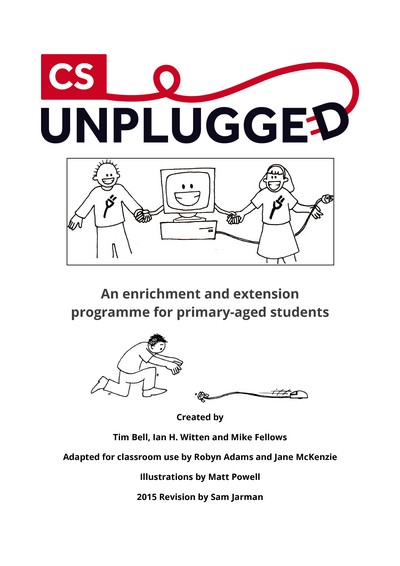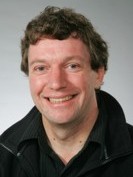
CS Unplugged: An enrichment and extension programme for primary-aged students
This book contains series of activities, games and puzzles that are suitable for people of all ages and backgrounds. Covers topics from algorithms to artificial intelligence, from binary numbers to boolean circuits, and from compression to cryptography.
Tag(s): Introduction to Computer Science
Publication date: 27 Sep 2015
ISBN-10: n/a
ISBN-13: n/a
Paperback: 243 pages
Views: 16,991
Type: Book
Publisher: Self-publishing
License: Creative Commons Attribution-NonCommercial-ShareAlike 3.0 Unported
Post time: 01 Jun 2017 07:00:00
CS Unplugged: An enrichment and extension programme for primary-aged students
 This book contains series of activities, games and puzzles that are suitable for people of all ages and backgrounds. Covers topics from algorithms to artificial intelligence, from binary numbers to boolean circuits, and from compression to cryptography.
This book contains series of activities, games and puzzles that are suitable for people of all ages and backgrounds. Covers topics from algorithms to artificial intelligence, from binary numbers to boolean circuits, and from compression to cryptography.
Publication date: 27 Sep 2015
ISBN-10: n/a
ISBN-13: n/a
Paperback: 243 pages
Views: 16,991
Document Type: Book
Publisher: Self-publishing
License: Creative Commons Attribution-NonCommercial-ShareAlike 3.0 Unported
Post time: 01 Jun 2017 07:00:00
Share — copy and redistribute the material in any medium or format
Adapt — remix, transform, and build upon the material
The licensor cannot revoke these freedoms as long as you follow the license terms.
Click here to read the full license.
Bell, et al. wrote:Computers are everywhere. We all need to learn how to use them, and many of us use them every day. But how do they work? How do they think? And how can people write software that is fast and easy to use? Computer science is a fascinating subject that explores these very questions. The easy and fun activities in this book, designed for studentren of all ages, introduce you to some of the building blocks of how computers work—without using a computer at all!
This book can be effectively used in enrichment and extension programmes, or even in the regular classroom. You don't have to be a computer expert to enjoy learning these principles with your students. The book contains a range of activities, with background information explained simply. Answers to all problems are provided, and each activity ends with a 'what's it all about?' section that explains the relevance of the activities.
Tweet
About The Author(s)
Tim Bell is a Professor in the Department of Computer Science and Software Engineering, College of Engineering, at the University of Canterbury. His research interests include computer science education, compression (Managing Gigabytes and The Burrows-Wheeler Transform), and computers and music.

Tim Bell is a Professor in the Department of Computer Science and Software Engineering, College of Engineering, at the University of Canterbury. His research interests include computer science education, compression (Managing Gigabytes and The Burrows-Wheeler Transform), and computers and music.
Michael R. Fellow is Professor of Computer Science in the Department of Informatics at the University of Bergen, Norway. He is recognized as one of the founders of parameterized complexity, a complexity framework that uses structure in hard problems for the design and analysis of algorithms for their solution. Parameterized complexity has strong connections to algorithmic engineering, and is increasingly important in fields as diverse as Artificial Intelligence, Cognitive Science, and Bioinformatics. Professor Fellow is also known for his innovative science communication.

Michael R. Fellow is Professor of Computer Science in the Department of Informatics at the University of Bergen, Norway. He is recognized as one of the founders of parameterized complexity, a complexity framework that uses structure in hard problems for the design and analysis of algorithms for their solution. Parameterized complexity has strong connections to algorithmic engineering, and is increasingly important in fields as diverse as Artificial Intelligence, Cognitive Science, and Bioinformatics. Professor Fellow is also known for his innovative science communication.
Ian Witten (@prof_martini) is Professor of Computer Science in the Department of Computer Science at the University of Waikato, New Zealand. His interests include Greenstone DL Software, New Zealand Digital Library, search engines and society, text mining, keyphrase extraction, machine learning, and information retrieval.

Ian Witten (@prof_martini) is Professor of Computer Science in the Department of Computer Science at the University of Waikato, New Zealand. His interests include Greenstone DL Software, New Zealand Digital Library, search engines and society, text mining, keyphrase extraction, machine learning, and information retrieval.